10 Things You Can Do to Help the Homeless

Persons with no fixed address live in what some refer to as an “invisible world”. With your help, they may not be stuck there. Making their day-to-day lives a bit easier is helpful and important. There ARE things you can do.
This list of ten things to do may seem a little bizarre to you. But, a List of Shelters is very different from a List of Food Pantries or Soup Kitchens.
If you take this list seriously and use some of the suggestions, you’ll understand.
You’ll see.
But, whether you try to do one item or all ten, I send you gratitude. The things you do will ripple kindness out beyond your circle. And, right now, kindness is needed desperately.
DEVELOP A LIST OF SHELTERS
Search out local shelters and create a list card. List each shelter by location and include phone numbers and a bit of information which may be helpful to those without addresses.
Distribute copies of this card to homeless people.
MAKE A LIST OF FOOD PANTRIES
A homeless-friendly food pantry distributes ready-to-eat items like peanut butter and crackers in individual packets, cereal and milk in individual containers. Some food pantries offer small containers of fresh fruits and vegetables.
Search out area food pantries that are homeless friendly. Make an info card listing hours and days each pantry is open. Include the phone number, address and directions to get there.
Distribute copies of this card.
INCLUDE A LIST OF SOUP KITCHENS
Search out area soup kitchens. Make an info card listing hours and days each soup kitchen is open. Include the phone number and address with directions to find it.
Carry copies of this card to distribute.
DONATE CLOTHING
Organizations serving the homeless always need gently used items in good condition. They need items in all sizes from infant to XXL and beyond.
Blankets and sleeping bags are in demand year round.
People are always asking for socks.
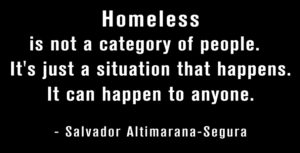
DONATE GROCERIES
Because the homeless carry their kitchens in their pockets, their food needs are specific: peanut butter and crackers in individual containers, individual packets of vegetables and fruits to be eaten raw (such as strawberries or carrots), cereal packed in individual containers, milk packed in individual containers.
When someone in your community conducts a food drive, donate a bag full of homeless-friendly foods.
If no one is having a food drive, fill a grocery bag with food and take it to your local food pantry, shelter, or soup kitchen.
Better yet, hold a food drive yourself.
In the past I’ve blogged posts about holding a food drive. Several dates of these posts include May 3, 2018, January 13, 2021 – February 11, 2021 – February 25, 2021. There are others.
Food drives are not difficult and they can be fun. Everyone should have the experience. Email me if you have questions. thurmangreo@gmail.com
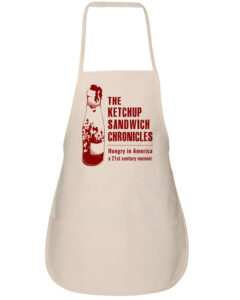
VOLUNTEER AT A SHELTER
Shelters depend on volunteers to sign people in, and cook and serve meals. Depending on the resources of the shelter, you may be able to do other things such as helping kids with homework, teaching ESL classes, writing resumes.
VOLUNTEER AT A SOUP KITCHEN
Soup kitchen volunteers pick up donations of food, help prepare and serve meals, cleaning up at the end of the shift.
VOLUNTEER AT A FOOD PANTRY
Volunteering at a food pantry is a community experience. I did it for years. Never, at any moment, did I feel I was wasting my time.
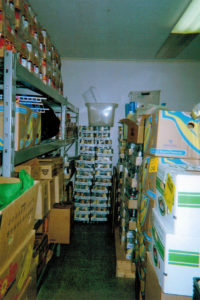
SHARE A MEAL
Whenever you leave your home, bring a bagged meal to share with a person on the street.
ADVOCATE
When you do a few of the things on this short list, you will find yourself involved in your community, even if that was not your intention.
Your interest in hunger and homelessness automatically makes you an advocate – even if you don’t think you are. When you help feed hungry and homeless people, you are fighting hunger in our country.
Most people in food pantries distribute a 3-day supply of food to everyone in each household.
But, however you see yourself, your good work, kindness, and generosity will ripple out beyond yourself and your community.
One thing is for sure, we need more good work, kindness, and generosity rippling out.
Something else happens when you share info cards, bagged lunches, food, and sleeping bags:
The homeless people you interact with begin to lose their invisibility. You replace that invisibility with respect when you treat them as individuals. Courtesy, kind words and a smile will change not only your life but theirs. .
You may even learn someone’s name!

Thank you for reading this blog post. Please share it with your favorite social media network.
Forward it to a friend or relative.
Learn more about hunger and homelessness on YOUTUBE at “Let’s Live with Thurman Greco”.

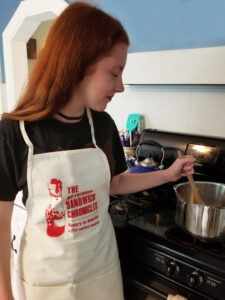
 Hats, aprons, T-shirts, and books are available at www.thurmangreco.com
Hats, aprons, T-shirts, and books are available at www.thurmangreco.com
Having touble finding YOUTUBE interviews? Send an email to thurmangreco@gmail.com. We’ll get you there!
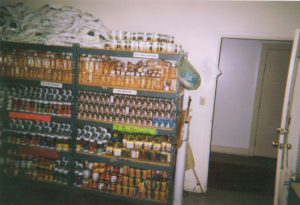
Thanks!
Thurman Greco
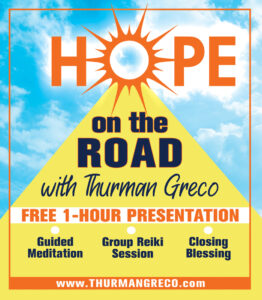
One last commercial here: A “HOPE on the ROAD” presentation was recorded and is on YOUTUBE. Tune in to YOUTUBE to benefit from this presentation.
I can present a segment of “HOPE on the ROAD” to your library, your organization, your class, your group.
If you are a Reiki practitioner, “HOPE on the ROAD” is easy to learn so you can present it to people in your area.
There is no charge for “HOPE on the ROAD”. To participate in “HOPE on the ROAD”, contact me at thurmangreco@gmail.com.
Thanks again,
Thurman
Good Neighbor Food Pantry and Woodstock Library Close
“Woodstock is completely packed with Coronavirus refugees from Brooklyn. We’re doing more business here in the post office than we have every done. This post office is busier than any Christmas rush has ever been.”
What a day!
I got a call from someone earlier today. “The food pantry is closed, Thurman. How can this happen?” As I went by the Woodstock Library, I saw a sign: “Closed”
The Coronavirus affects us all. We cannot avoid the reality. People jokingly call our community Brooklyn North.
As long as you have a car and money and an apartment and a cell phone and a computer, all you have to worry about is the spread of germs. But, that’s not how it is with everyone. Without a car and money and an apartment and a computer and a call phone, your life tells a different story.
Without those luxuries, your lifeline requires a food pantry and a library.
The library is essential because it’s your ticket to information about food, housing, and anything else you need to find. A library will help you find everything you need to survive. And, while it’s giving you information, a library roof keeps you dry. The walls of the library keep you warm and comfortable while you seek all that you need.
And, of course, the library has one other luxury people don’t talk about much: a bathroom. If you are without food and a roof and a computer and a cell phone, a bathroom is essential.
So, while the Woodstock Reformed Church has closed its doors, most of the food pantries in New York state are figuring out how to get food to people. They are receiving support from the Food Bank.
In fact, the Food Bank of the Hudson Valley reports that volunteers are responding to every emergency request received. This includes food deliveries to seniors, quarantined and high-risk individuals, school back pack programs.
If you can get to a phone, there are a couple of phone numbers you can call. Try 845-399-0376 or 845-633-2120.
Sources tell me that many food pantries and soup kitchens are not closed. I truly hope you can find one.
So, what can we do? Well, for starters, try to contact people you know but seldom see and find out how they are doing. Do they need anything? Is there anything you can do?
Contact food pantries and soup kitchens in your area and see if they need anything. My bet is that they do. My bet is they need food.
Times are serious. Your help is needed!
If you run out of ideas, contact me at thurmangreco@gmail and I’ll send you, free of charge, my three action guides with practical tips for fighting hunger and homelessness.
Thank you for reading this article. Please refer it to your preferred social media network.
Thanks again!
Thurman Greco

Abundance 2: LeAnna, Catherine, and Jane – Women, Mothers, and Hunger in the Food Pantry

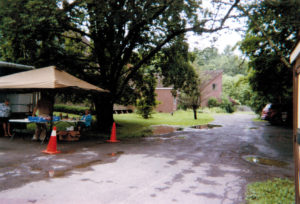
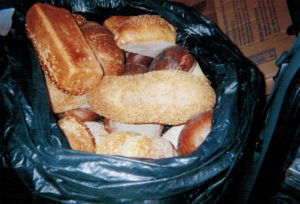
Abundance. LeAnna volunteered in the pantry. She had a business degree, a house, two adorable children and a spouse with a fancy career post somewhere in Europe. He decided he wanted nothing to do with her anymore. No money came across the ocean for her and the children. There was no money for taxes she owned on the house, or anything else for that matter.
LeAnna was happy to take the vegetarian items available each week. Her children loved fresh vegetables so there was much to choose from. The girls saw yogurt as a treat.
Catherine had a house full of children including two so close together, I thought they were a set of twins. She couldn’t get it together to work. And, I doubt if she could have gotten employment in our area anyway. This lovely lady had two advanced degrees.
There weren’t many, or possibly any, jobs available in Ulster County in her career field. And, of course, once a woman gets an advanced degree, the lower level jobs aren’t open to her unless she hides the education. Sometimes education can be hidden. Sometimes not. It all depends on the situation. The main thing is to get it off the resume.
Catherine was open-minded about the food she selected. She took anything not tied down. Because she qualified for cases of USDA, Catherine left the pantry with a case each of pasta sauce, canned corn, green beans, vegetarian beans, refried beans.
When she finished shopping, ten-year-old Robert Allen, our next-to-youngest volunteer, brought out the flatbed metal wheeled cart, put her groceries on it, and wheeled them to her car. Little toddler Mikey, our youngest volunteer, ran along behind.
I saw Jane, the young mother who couldn’t work because her husband threw her up against a wall, injuring her back. She had an eight-year-old child she was trying to raise without the luxury of child support.
Jane chose items from shelves where bending and stretching weren’t necessary because she couldn’t do those things.
And, to return to the beginning of Abundance, these three families and referenes to the critics about shoppers all owning upscale cars – Catherine, LeAnna, and Jane owned fairly late model SUV’s in good condition. They invited the criticism of the pantry naysayers when they drove into the parking lot to shop.
Here we had three households, single-headed households in need of food. If not for a couple of years, then for several months.
For some, feeding hungry people means we fed freeloaders. Not all hungry people look needy. Some of the best-dressed people in Woodstock never spent a dime on their clothes. They had no money for clothes so they shopped at Family of Woodstock.
Neither of these households was homeless, although they could be when the tax collector came to call.
Neither of these households was without transportation although they could be if the SUV needed expensive repairs. Nobody in these households looked poverty-stricken although they could be if the car needed repairs.
For the moment, neither LeAnna, Catherine, nor Jane looked poverty-stricken although, they would in time with no child support from the spouse to help with expenses.
These three women had several things in common. They were divorced. They had children. They received no money from the ex-spouse even though each one had a lucrative, influential employment career, money, and a bright future.
There was not a job among them.
There was little or no money for a food budget even.
LeAnna, Catherine, and Jane each lived with abundance on one hand, a large box of unpaid bills on the other hand, and hope, dreams, and fears somewhere in the middle.
The children were eligible for school breakfast and lunch programs. But, that didn’t give them enough food to eat at home. And, there was no lunch program for the mothers.
So, it was off to the pantry. This was a life-changing decision. Using a pantry requires commitment, endurance, and effort. Attitudes about food in particular and life in general change.
Pantry shoppers are often self-disciplined, self-controlled, determined to do what is best for the family.
Freeloaders? What do you think?
Every week when these women shopped I saw myself as a young woman returning from Mexico with my two daughters and nothing but the clothes on my back. There was no way anyone, just by looking at me, would have known how little I had.
Whether we come to the pantry as shoppers, volunteers, or both, all of us are asked by the pantry to leave; the past behind. And, of course, that’s different for everyone.
How can we move forward into a new life if we never give anything up? For some, giving up the past means letting go of the job we lost, the home, the furniture that went in the home, maybe the family, self-esteem, the car, good health.
What happens in the pantry, this shopping, this offloading, has the potential to be the greatest journey of one’s life. The hungry person learns things in new ways, and sees things never noticed before. And, finally, there is the knowledge that anything can happen. When all is said and done, things will never be the same again. Better off for the experience, thoughts change.
Beliefs and core values are found.
I’m sticking my neck out here to say this.
Being hunger in 21st century America is a spiritual journey involving miracles, forgiveness, endurance, and spiritual healing. It’s all about discovering that it’s never too late to be who you really are.
That’s what this story is all about.
Thank you for reading this blog post in two parts. Please forward it to your preferred social media network.
Thurman Greco



